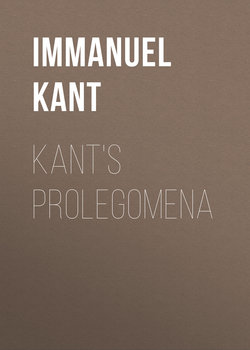Читать книгу Kant's Prolegomena - Immanuel Kant, Иммануил Кант - Страница 1
PUBLISHERS' PREFACE
ОглавлениеKANT'S Prolegomena,1 although a small book, is indubitably the most important of his writings. It furnishes us with a key to his main work, The Critique of Pure Reason; in fact, it is an extract containing all the salient ideas of Kant's system. It approaches the subject in the simplest and most direct way, and is therefore best adapted as an introduction into his philosophy. For this reason, The Open Court Publishing Company has deemed it advisable to bring out a new edition of the work, keeping in view its broader use as a preliminary survey and explanation of Kant's philosophy in general. In order to make the book useful for this broader purpose, the editor has not only stated his own views concerning the problem underlying the Prolegomena (see page 167 et seq.), but has also collected the most important materials which have reference to Kant's philosophy, or to the reception which was accorded to it in various quarters (see page 241 et seq.). The selections have not been made from a partisan standpoint, but have been chosen with a view to characterising the attitude of different minds, and to directing the student to the best literature on the subject.
It is not without good reasons that the appearance of the Critique of Pure Reason is regarded as the beginning of a new era in the history of philosophy; and so it seems that a comprehension of Kant's position, whether we accept or reject it, is indispensable to the student of philosophy. It is not his solution which makes the sage of Königsberg the initiator of modern thought, but his formulation of the problem.
* * *
The present translation is practically new, but it goes without saying that the editor utilised the labors of his predecessors, among whom Prof. John P. Mahaffy and John H. Bernard deserve special credit. Richardson's translation of 1818 may be regarded as superseded and has not been consulted, but occasional reference has been made to that of Prof. Ernest Belfort Bax. Considering the difficulties under which even these translators labored we must recognise the fact that they did their work well, with painstaking diligence, great love of the subject, and good judgment. The editor of the present translation has the advantage of being to the manor born; moreover, he is pretty well versed in Kant's style; and wherever he differs from his predecessors in the interpretation of a construction, he has deviated from them not without good reasons. Nevertheless there are some passages which will still remain doubtful, though happily they are of little consequence.
As a curiosum in Richardson's translation Professor Mahaffy mentions that the words widersinnig gewundene Schnecken, which simply means "symmetric helices,"2 are rendered by "snails rolled up contrary to all sense" – a wording that is itself contrary to all sense and makes the whole paragraph unintelligible. We may add an instance of another mistake that misses the mark. Kant employs in the Appendix a word that is no longer used in German. He speaks of the Cento der Metaphysik as having neue Lappen and einen veränderten Zuschnitt. Mr. Bax translates Cento by "body," Lappen by "outgrowths," and Zuschnitt by "figure." His mistake is perhaps not less excusable than Richardson's; it is certainly not less comical, and it also destroys the sense, which in the present case is a very striking simile. Cento is a Latin word3 derived from the Greek κεντρων,4 meaning "a garment of many patches sewed together," or, as we might now say, "a crazy quilt."
* * *
In the hope that this book will prove useful, The Open Court Publishing Company offers it as a help to the student of philosophy.
P.C
1
Prolegomena means literally prefatory or introductory remarks. It is the neuter plural of the present passive participle of προλέγειν, to speak before, i.e., to make introductory remarks before beginning one's regular discourse.
2
Mahaffy not incorrectly translates "spirals winding opposite ways," and Mr. Bax follows him verbatim even to the repetition of the footnote.
3
The French cento is still in use.
4
κέντρων, (1) one that bears the marks of the κέντρο, goad; a rogue, (2) a patched cloth; (3) any kind of patchwork, especially verses made up of scraps from other authors.
